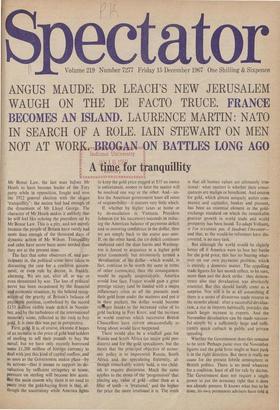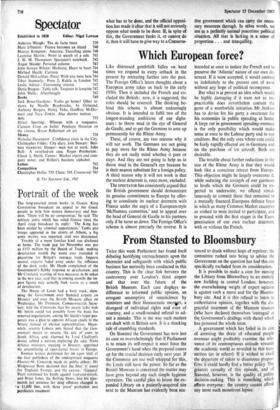A n to.. or tian q uillity A JAw G 10 M.r
Bonar Law, the last man before Mr Heath to have become leader of the Tory party while in opposition, fought and won the 1922 general election with the slogan `tranquillity': the nation had had enough of the dynamism of Mr Lloyd George. The character of Mr Heath makes it unlikely that he will feel like echoing the precedent set by Mr Bonar Law. This is a pity, and not merely because the people of Britain have surely had more than enough of the thousand days of dynamic action of Mr Wilson. Tranquillity and calm have never been more needed than they are at the present time.
The fact that sober observers of, and par- ticipants in, the political scene have taken to discussing the case for a coalition govern- ment, or even rule by decree, is, frankly, alarming. We are not, after all, at war or even threatened by war. The loss of political nerve has been occasioned by the financial and economic situation; by the belated recog- nition of the gravity of Britain's balance of payments position, symbolised by the record £153 million visible trade deficit in Novem- ber, and by the turbulence of the international monetary scene, reflected in the rush to buy gold. It is time this was put in perspective.
First, golf. It is, of course, irksome if hopes of an increase in the price of gold lead holders of sterling to sell their pounds to buy the metal; but we have only recently borrowed some £1,200 million of foreign currency to deal with just this kind of capital outflow, and as soon as the Government makes plain—by its actions—that it means to support its de- valuation by sufficient stringency at home, pressure on sterling will become less acute. But the main reason why there is no need to Panic over the gold-buying fever is that, al- though the uncertainty while America fights to keep the gold price pegged at $35 an ounce is unfortunate, sooner or later the matter will be resolved one way or the other. And—un- less the American government loses all sense of responsibility--it matters very little which.
If, whether by higher taxes at home or by de-escalation in Vietnam, President Johnson (or his successor) succeeds in reduc- ing the American balance of payments deficit and so restoring confidence in the dollar, then we are simply back to the status quo ante. If, on the other hand, the us deficit continues unabated until the dam bursts and Washing- ton is forced to acquiesce in a higher gold price (commonly but erroneously termed a `devaluation' of the dollar—which would, in fact, continue to be worth the same in terms of other currencies), then the consequences would be equally unapocalyptic. America would lose face, France would gain a great prestige victory (and be landed with a major inflationary crisis as all the peasants took their gold from under the mattress and put it in their pocket), the dollar would become strItiger thanks to the increased value of its gold backing in Fort Knox, and the increase in world reserves which successive British Chancellors have striven unsuccessfully to bring about would have happened.
There would also be a windfall gain for Russia and South Africa (as major gold pro- ducers) and for the gold speculators; but the thesis that the principal objective of econo- mic policy is to impoverish Russia, South Africa and the speculating fraternity, al- though remarkably widely held, is too child- ish to require discussion. Much the same applies to the moan of the 'progressives' that placing any value of gold—other than as a filler of teeth—is 'irrational,' and the higher the price the more irrational it is. The truth is that all human values are ultimately irra- tional : what matters is whether their conse- quences are malign or beneficent. And esteem for gold, which almost uniquely unites com- munist and capitalist, banker and peasant, has been an essential element in the gold- exchange standard on which the remarkable postwar growth in world trade and world prosperity has been based. To adapt Voltaire, si l'or n'existan pas, it faudrait-l'inventer- and that, as the would-be reformers have dis- covered, is no easy task.
But although the world would be slightly better off if America were to lose her battle for the gold price, this has no bearing what- ever on our own payments problem, which is entirely a domestic matter. The appalling trade figures for last month reflect, to be sure, more than just the dock strike : they demon- strate also that devaluation was absolutely essential. But this should hardly come as a surprise. Nor will it be at all astonishing if there is a series of disastrous trade returns in the months ahead : after a successful devalua- tion, a rise in imports habitually precedes the much larger increase in exports. And the November devaluation can be made success- ful simply by a sufficiently large and suffi- ciently quick cutback in public and private spending.
Whether the Government does this remains to be seen. Perhaps panic over the November figures and the gold fever might at least push it in the right direction. But there is really no cause for the present febrile atmosphere in British politics. There is no need whatever for a coalition, least of all for rule by decree. The Government does not require a single power to put the economy right that it does not already possess. It knows what has to be done, its own permanent advisers have told it what has to be dune, and the official opposi- tion. has made it dear that it will not seriously oppose what needs to be done. If, in spite of this, the Government funks it, or cannot do it, then it will have to give way to a Conserva- live government which can carry the neces- sary measures through. In other words, we are in a perfectly normal peacetime political situation. All that is lacking is a sense of proportion . . . and tranquillity.



































